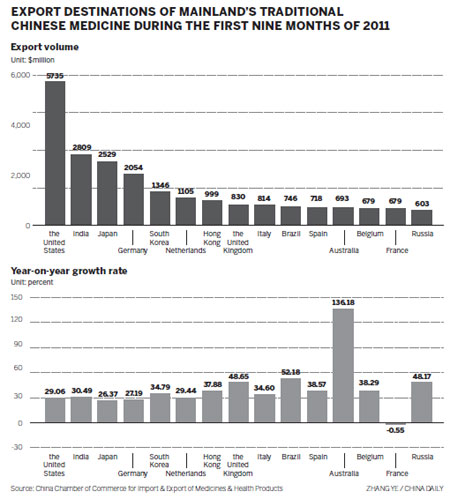 |
|
|
|
|||||||||
New trend
Founded in 2013, Xi'an Hao Tian Bio-engineering Technology Co Ltd is a young TCM manufacturer and China's biggest exporter of plant extracts by sales. The company's export volume has increased by 50 percent annually during the last few years and hit 600 million yuan ($95 million) in 2011.
According to Zhang Chengwen, general manager of the Shaanxi province-based company, Xi'an Hao Tian plans to become a leading producer of herbal extracts, with five of its products each occupying more than 40 percent of their respective international markets within five to 10 years.
Zhang said that the global demand for plant extracts is currently valued at between $1.5 billion and $2 billion, and the figure is expected to increase by around 10 percent annually in the next few years.
In 2006, Xi'an Hao Tian developed Coenzyme Q10, an oil-soluble, vitamin-like substance, which also occurs naturally in the body. The move broke Japan's monopoly on the product, which is used in the treatment of cardiovascular and metabolic diseases.
"China's plant-extracts industry is based on traditional Chinese theories as well as rich plant resources and cultivation experience, advantages that are unique," said Zhang.
The company is keeping a close eye on the fluctuating global economy. "The slowdown in the developed economies may result in a drop in demand for some types of products, including healthcare supplements, which will force us to adjust our export structures and reduce costs," he added.
Meanwhile, India and Brazil have also entered the international market for plant extracts. "We need to speed up and explore more local plant species, while working within the framework of environment protection and biological conservation," said Zhang.
As more competitors arrive on the international scene, TCM manufacturers are also exploring emerging markets, such as Australia, Russia, Eastern Europe and Africa.
In 20011,Guangzhou Pharmaceutical Holdings Limited joined with two Australian counterparts to establish a registration and sales center for traditional herbal medicines in the country. "Australia, the US and the EU are multi-recognitional in terms of the registration of medicines, thus we hope to take a shortcut and enter the US and EU markets via Australia," said Li Chuyuan, the general manager of Guangzhou Pharmaceutical.
In September, Liu's import-export chamber organized a visit to Russia for officials and companies. The trip included negotiations with local governments and trading agencies. "We discovered that the local people are very interested in TCMs, and the Russian government has implemented policies to help Chinese TCM makers introduce their products and services to the nation. I believe Russia will become a promising market for Chinese companies in the future," said Liu.
With regard to Africa, Liu said the expansion of TCMs will depend on local economic development and it will take some time for Chinese TCM makers to turn a profit on the continent. Meanwhile, Guo said the government's policies in support of Sino-African trade and economic cooperation will pave the way for Chinese TCM makers to enter the African market.
liujie@chinadaily.com.cn
